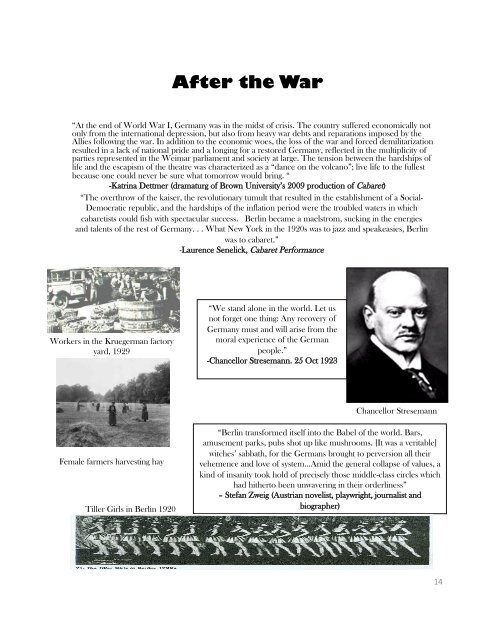Create successful ePaper yourself
Turn your PDF publications into a flip-book with our unique Google optimized e-Paper software.
After the War<br />
“At the end of World War I, Germany was in the midst of crisis. The country suffered economically not<br />
only from the international depression, but also from heavy war debts and reparations imposed by the<br />
Allies following the war. In addition to the economic woes, the loss of the war and forced demilitarization<br />
resulted in a lack of national pride and a longing for a restored Germany, reflected in the multiplicity of<br />
parties represented in the Weimar parliament and society at large. The tension between the hardships of<br />
life and the escapism of the theatre was characterized as a “dance on the volcano”; live life to the fullest<br />
because one could never be sure what tomorrow would bring. “<br />
-Katrina Dettmer (dramaturg of Brown University’s 2009 production of <strong>Cabaret</strong>)<br />
“The overthrow of the kaiser, the revolutionary tumult that resulted in the establishment of a Social-<br />
Democratic republic, and the hardships of the inflation period were the troubled waters in which<br />
cabaretists could fish with spectacular success. Berlin became a maelstrom, sucking in the energies<br />
and talents of the rest of Germany. . . What New York in the 1920s was to jazz and speakeasies, Berlin<br />
was to cabaret.”<br />
-Laurence Senelick, <strong>Cabaret</strong> Performance<br />
Workers in the Kruegerman factory<br />
yard, 1929<br />
Female farmers harvesting hay<br />
Tiller Girls in Berlin 1920<br />
“We stand alone in the world. Let us<br />
not forget one thing: Any recovery of<br />
Germany must and will arise from the<br />
moral experience of the German<br />
people.”<br />
-Chancellor Stresemann. 25 Oct 1923<br />
Chancellor Stresemann<br />
“Berlin transformed itself into the Babel of the world. Bars,<br />
amusement parks, pubs shot up like mushrooms. [It was a veritable]<br />
witches’ sabbath, for the Germans brought to perversion all their<br />
vehemence and love of system…Amid the general collapse of values, a<br />
kind of insanity took hold of precisely those middle-class circles which<br />
had hitherto been unwavering in their orderliness”<br />
– Stefan Zweig (Austrian novelist, playwright, journalist and<br />
biographer)<br />
14



